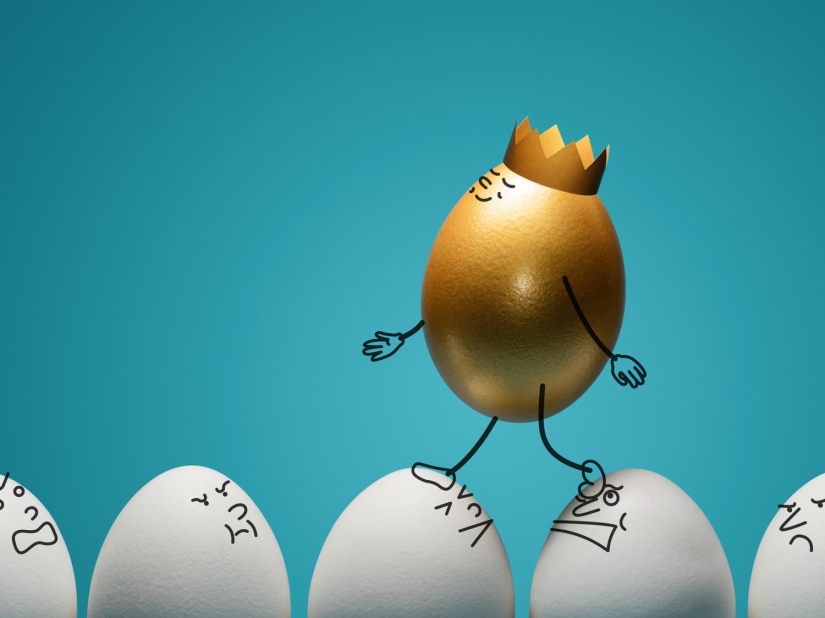Everyone will leave, but I will stay. What is narcissism and when is it healthy and when is it pathological?
Categories: People | Psychology | Society | World
By Vika https://pictolic.com/article/everyone-will-leave-but-i-will-stay-what-is-narcissism-and-when-is-it-healthy-and-when-is-it-pathological.htmlAccording to statistics, every sixth person in the world suffers from narcissism. And another 5% of them have a narcissistic personality disorder. And we don’t know if we will surprise you or not, but 75% of these people are men.
“After a relationship with my Narts (Abbreviation of the word “Nazis.” - Ed. note), I am ready to brush aside all men who come closer to me than three meters,” such a comment was seen in the chat of the New Wings Telegram channel in which women deconstruct painful relationships with narcissistic men and share personal stories. Members of this community can be divided into two types: some cannot recover from a relationship with a narcissist, while others have worked through this trauma for a long time and are now trying to help others get out of this hole.
In general, in recent years, the concept of narcissism has received more attention than ever. The popularization of films and TV shows in which one of the characters does not give life to those around him has turned into the fact that daffodils have become no worse than princes on a white horse. But is narcissism always a pathology? And is there a healthy love for yourself that does not go beyond any limits?
Analytical psychologist Olga Makarova tells how to distinguish healthy narcissism from one that is better hidden from prying eyes.
3 PHOTOS

1. Olga Makarova, psychologist
To begin with, we single out three types of narcissism, which we will consider in turn:
- healthy narcissism;
- pathological narcissism;
- narcissistic trauma.
Healthy, or Primary Narcissism
A stage that every person goes through in childhood. This is the primary stage of development, the initial stage of the formation of the ego. It can be described as follows: the child feels himself omnipotent, and the whole world sees as his continuation. “I wanted to eat, I thought about it, and now they are already feeding me. Everything is my extension, the world exists to serve me, and there are no other separate beings and their interests. I am the whole world."
The child needs this, at this stage he gets the feeling that the surrounding reality is safe and his needs can be met.
Further, the task of the mother is to reflect the child as a separate person with his own characteristics, to see his separateness and uniqueness. If everything worked out without serious failures, the stage is successfully completed, and the child becomes the owner of a healthy narcissism and develops further.
What does a person who successfully passes this stage receive? Feeling of self-importance. Conditionally - we are in order and the world is good. Being yourself is cool and safe, you can and should show up, and our individuality is beautiful and priceless.

2. Shot from the film "The Picture of Dorian Gray"
Narcissism is pathological, or secondary
However, if there is a serious failure in what was said above and the psyche of a person is stuck in this infantile narcissistic stage, without passing it, pathological or secondary narcissism, or even narcissistic personality disorder, arises.
And in fact, this is exactly what is being so actively discussed on the forums, in the channels, and in the comments. This is it, the very narcissism, in honor of which publics and communities are created with topics like "How I became a victim of a narcissist."
“I am the whole world” - this is how an infant thinks at a narcissistic stage of development, and an adult thinks in the same way, whose psyche has not got out of this stage. For him there are no separate people around, he simply does not see them. Everyone is his narcissistic extension, so he tries to surround himself with the best. So he manages to believe that he, too, is nothing. The clinical narcissist has no empathy, he does not understand at all what others feel, and he is not interested. True, he can learn to guess, if it will be useful to him.
“If the world is made for me, and I am the whole world, then I must be very unique, right?” Everything is unique with a narcissist - love, career, gait, suffering. By the way, one of the reasons why this disorder is not amenable to therapy is “no one can cure me and understand my unique suffering, and you won’t do anything, because you are just a psychotherapist.”
Often narcissism is understood as narcissism, which is completely wrong. It may look like self-love, but the main secret and feature of the pathological narcissist is that he does not know and love himself at all, and feels a terrible emptiness inside. And she is terrified that someone else will notice her.
He spends an unthinkable amount of energy on cultivating and fertilizing a grandiose false self. A façade that hides its inner emptiness from others. Therefore, narcissists are very fond of brands, status things, status friends, shiny cars, and brilliant careers - in general, he needs all the best. So he defends himself and tries to hide his terribly fragile, vulnerable, and painful true self.
In fact, a narcissistic personality disorder is a severe psychological disability. Because it is not treated, and this emptiness is not filled with anything. Therefore, the popular idea of narcissists as happy and narcissistic scoundrels who always win because they don’t give a damn is completely wrong. They suffer very, very much.

3. Shot from the film "My King"
Narcissistic trauma
The third type of narcissism that is important to talk about is narcissistic trauma, the trauma of rejection. It is important to understand that absolutely everyone has some kind of narcissistic disorder. The only question is the degree, and if the degree is sufficient, then trauma occurs, and a narcissistic character is formed in a person. If you find many of the traits that have been described in relation to narcissistic disorder, don't get scared - they may also be characteristic of a person with a narcissistic injury.
The difference will be that these traits:
a) will most likely not be dramatically pronounced;
b) with difficulty and hardship, but still can be recognized and integrated into consciousness, and therefore partially overcome.
The clinical narcissist will never really be able to do this. Another tip is empathy. It is available to people with narcissistic trauma. With pathology - no, not at all.
There is a little exercise that will help you explore this topic in your psyche. As already mentioned, everyone has a narcissistic disorder, because everyone once experienced a feeling of rejection. You can't grow without it, it's part of development. And some parts of us were rejected in one way or another in the parental family. How to check? Remember in what manifestations you were “too much” for your parents. Too loud or too quiet, too aggressive, too frivolous, too smart, too stupid. These will be the parts through which a person receives a narcissistic wound and experience rejection. Everything else and all manifestations of this in relationships - love, friendship, work - are just echoes and projections of the first experience, such a tail that we always drag behind us.

4. Shot from the film "The Good Liar"
What to do if your partner is a narcissist?
What I want to say separately - is about the already mentioned victims of daffodils. If you think you're suffering from a relationship with a narcissist, it's vital to realize three things.
“You are also, in a sense, a narcissist, at least a narcissistically wounded person. Otherwise, you wouldn't be in this relationship. There is such a thing as victim narcissism, which is when a person essentially revels in the uniqueness of their suffering, the uniqueness of their unhealthy relationships, and also what a unique villain they got. This is also narcissism. And hanging out in groups where they discuss narcissists and their tricks is his bloat.
- Earlier in the material, the word “projection” was mentioned, but in a relationship, you cannot do without it. A person projects onto the narcissist their own grandiose part, confidence, dignity, brightness, and uniqueness. For some reason, you can't own them. And the narcissist, in turn, projects his worthlessness onto you, so he humiliates and neglects you. It is important to see this and assign your own beautiful parts to yourself, then such relationships can be bypassed.
- The focus must be shifted to yourself, and the main question should be: “Why did I find myself in this relationship? What is it about me that brings me to them?”
Only the return of responsibility for one's own life and focus on oneself can lead to harmony and healing. This, by the way, works not only with narcissism - it is one of the most universal and basic laws in psychology.
Keywords: Narcissism | Pathological | Mental health | Mental problems | Psychology | People | Narcissistic personality | Personality disorder
Post News ArticleRecent articles

No matter how we strive for positive, but negative feelings and emotions are an integral part of our life. And if you can’t avoid ...

If your mailbox is located outside, this is the first thing that catches your eye when someone comes to your door, whether it's the ...
Related articles

I’m no Jeff Bezos but I know that how I start my mornings can make or break the day.

You become what you think.

Mental health is one of the most important indicators in the modern world, where endurance, stress resistance, and purposefulness ...

At the word "harem" most people come up with colorful pictures-an abundance of seductive half-dressed women, gurgling water ...